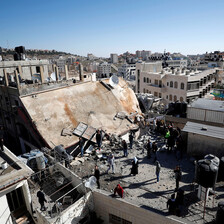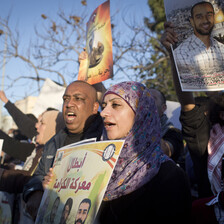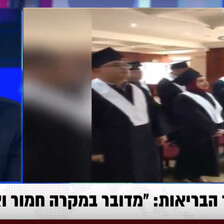The Electronic Intifada Jerusalem 31 December 2015

Mahmoud Alayan
Mahmoud Alayan was a Fatah party supporter and an active member of its campus chapter at his school.
He was also an implacable opponent of the status quo in occupied territory to which a Fatah-dominated Palestinian Authority clings.
The Israeli occupation, he insisted, had to be confronted. And so he did, in defiance of his own leadership and an authority that has invested heavily in preventing confrontations with the army.
That defiance ultimately cost him his life. He was fatally wounded by a rubber-coated steel bullet fired by Israeli soldiers at a demonstration in November near the Beit El settlement outside al-Bireh, a West Bank town contiguous with neighboring Ramallah, seat of the PA.
Over the past week, the PA has been dispersing — violently at times — demonstrators trying to march on the checkpoint near the Beit El settlement, home to the Civil Administration, the bureaucratic arm of Israel’s military occupation.
The PA had recently allowed demonstrations in the area, a departure from previous policy, not wishing to itself become the target of growing Palestinian frustrations.
The generation to which Mahmoud Alayan belongs — born after the Oslo agreement signed by Israel and the Palestine Liberation Organization, leading to the creation of the PA — is disillusioned with decades of peace talks that have not slowed Israeli colonization and violence.
The youth instead opt for confrontation. And for those who align themselves with the Fatah movement, founded by the late Yasser Arafat, this means breaking away from party leadership.
Rock in hand
Alayan, 19, was a constant presence at the Beit El protests. He was injured, rock in hand, on 11 November – the anniversary of Arafat’s death – during confrontations outside the settlement. A fellow protester carried him away before Israeli soldiers could seize him. He was transferred – with a wound to the head – to a Ramallah hospital.
Alayan was an active member of Fatah’s youth wing at the Modern University College in Ramallah, where he was a third-year nursing student.
“True, he is affiliated with Fatah but he also believes that the Palestinian leadership has failed the people,” his mother, Nadhmiyeh, told The Electronic Intifada.
“He grew increasingly disillusioned with the Palestinian Authority and has publicly expressed that, including on the day of his injury, during an event honoring the late Palestinian president Yasser Arafat,” she added.
A day after he was injured, Alayan was transferred from Ramallah to an Israeli hospital in Tel Aviv.
“I knew that his situation was critical and that nothing short of a miracle would keep him alive. Doctors also warned me that should he survive, he will likely be permanently disabled. But I also had hope,” his mother recalled.
“Those eight days he spent in the hospital felt longer and more arduous than the whole 10 years we spent waiting for him to come into to this world,” she added.
Bright future
Mahmoud was born on 18 February 1996 after more than a decade of fertility treatment, and after Nadhmiyeh and her husband Said nearly lost hope of ever having kids.
Nadhmiyeh said that the birth of her first child was the happiest day of her life.
They marked his birthday this year with a surprise party for Mahmoud, whose future looked bright — he was due to graduate in a year and start practicing the job that he learned to love most.
“My life already feels empty without him and I cannot even contemplate the idea of us not celebrating his 20th birthday together,” Nadhmiyeh said. “I miss him asking me to cook lasagna, his favorite dish, and I will surely miss seeing him slice his birthday cake next year.”
Born and raised in the East Jerusalem neighborhood of Anata, Mahmoud had initially hoped to study information technology but was persuaded by an uncle to pursue nursing.
“He had all the qualities that would make him an admired nurse: he was always quick to help those in need; he was kind-hearted and treated everyone with respect and tenderness,” said his aunt, Huda Abd al-Baqi.

Palestinian youths confront Israeli occupation forces near Beit El on 11 November. Mahmoud Alayan was fatally wounded during the protest.
APA imagesMahmoud’s 18-year-old brother Muhammad, who studies in Jordan, came back to Palestine immediately after learning of his brother’s injury and remained by his side.
But Marwa, Mahmoud’s 16-year-old sister and the person closest to him, could not summon the fortitude to see him in coma.
“I only saw him after his death, when he was taken to the Ramallah hospital morgue,” she said, struggling to maintain composure.
“Mahmoud was my best friend. I counted on him to keep my secrets and give me advice. I would tell him things that I wouldn’t even vouch to my mother,” Marwa added.
“Mahmoud was the kindest brother in the world,” added younger sister Muna.
Massive funeral
Alayan was pronounced dead on the evening of 19 November.
“He fought to stay alive until his last breath,” his mother said.
Thousands from Anata, Shuafat refugee camp and other Jerusalem neighborhoods attended Alayan’s funeral the following day.
The massive funeral was “no surprise,” Faisal Rifai, a friend of Alayan and a journalism student at Modern University College, told The Electronic Intifada.
“Mahmoud was a very active and popular guy … He always helped organize actions to commemorate anniversaries such as Land Day, the Nakba, the intifadas, etcetera,” Rifai said. “Whenever there was a political action at college, you know that Mahmoud was one of those behind it.”
Mahmoud was also active off campus. He regularly attended anti-occupation protests well before the latest uprising.
“I’ve never seen him as animated as he had been since October,” his mother said, referring to the ongoing escalated confrontations with Israeli occupation forces. “He believed that it was up to this young generation to act in order to protect Jerusalem and al-Aqsa mosque.”
Mahmoud was not yet 7 when his father died after a long battle with cancer. His father’s premature death meant that his mother became his main reference point. Since he was a kid, he accompanied her when running errands. He helped her harvest their olives, clean the house and fulfill social obligations such as going to funerals and weddings.
It was she who instilled in him the obligation to resist the Israeli occupation and stand up for Palestinian rights.
“I always talked to Mahmoud, even while he was in my womb,” Nadhmiyeh said. “I told him that he has to be strong and courageous and make up for all the years that had gone by while waiting for him.”
Nadhmiyeh is proud of her son, but cannot help feel a measure of regret.
“I wish I could have locked him up at home and prevented him from going that day,” Nadhmiyeh said.
“She is doing her best to conceal her pain and appear strong because her young daughters would otherwise collapse,” Nadhmiyeh’s sister, Huda, said. “She cannot afford to look weak, but her loss is too big for words.”
Nadhmiyeh said that two things have kept her going after losing the son she tried for years to bring into the world: her faith in God and her conviction that Mahmoud lost his life on the front lines of a just cause.
Others clearly have the same conviction. Whatever their political persuasions, the youth keep streaming to Beit El and other locations. Theirs is not just a confrontation with occupation. Increasingly, it is a confrontation with what they see as a subservient Palestinian Authority.
Budour Youssef Hassan is a Palestinian writer and law graduate based in occupied Jerusalem. Blog: budourhassan.wordpress.com. Twitter: @Budour48





